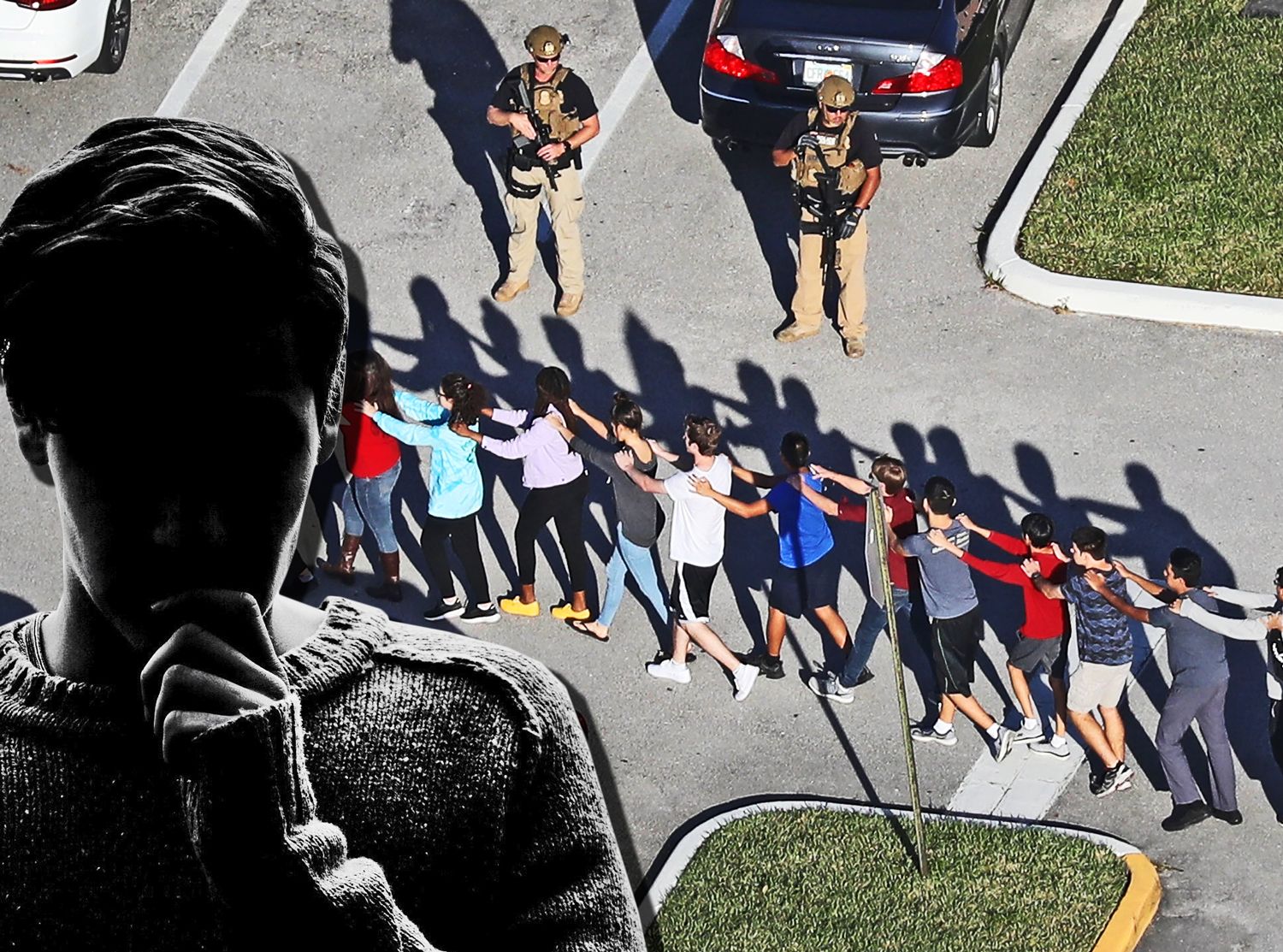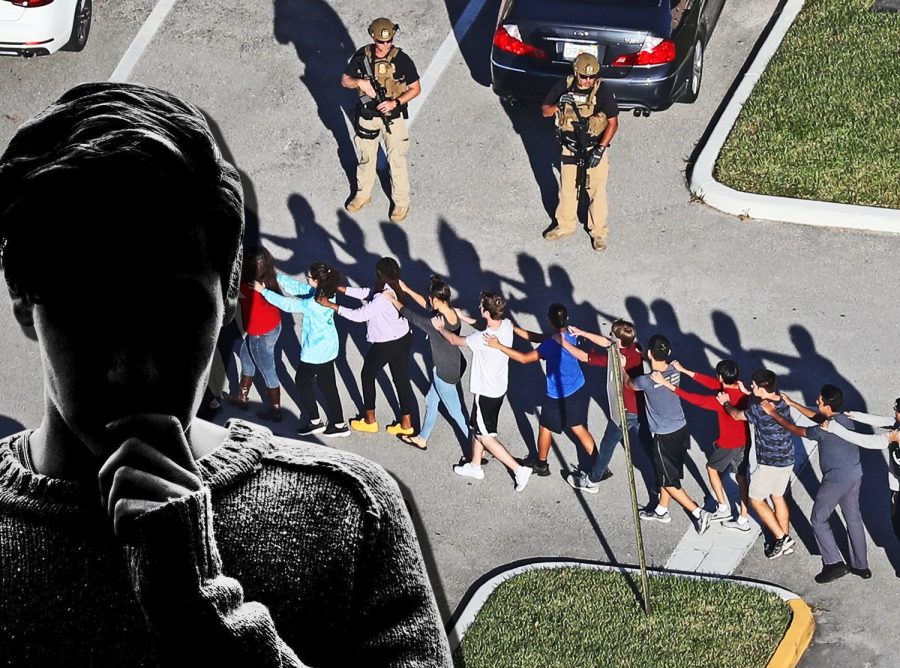Cameron Cozzi
 According to Everytown for Gun Safety, America has experienced 65 shootings on school campuses in 2018 alone (as of October 4). On February 14, seventeen people were killed at Marjory Stoneman Douglas High School in Parkland, Florida. On May 18, ten people were killed at Santa Fe High School in Santa Fe, Texas.
Though gun legislation is being debated on a national scale, progress is slow and change has been hard to come by. Meanwhile, schools are taking action to protect their students with lockdown drills.
Lockdown drills became an essential part of many schools’ safety plans following the 1999 shooting at Columbine High School in Littleton, Colorado, which killed thirteen people and injured more than twenty others. At the time, this was the worst school shooting in United States history. Thirteen years after Columbine, explained the Washington Post, lockdown drills became nearly as common as fire drills. This change was prompted by the second deadliest school shooting in United States history: the massacre at Sandy Hook Elementary School in Newton, Connecticut, in which twenty-seven people were killed.
At Latin, lockdown drills are a critical part of safety procedure. These drills help students and faculty understand what steps to take in the case of an active threat, which helps ensure that the Latin community is both safe and prepared in case of a tragedy. However, given the increasing number of shootings on school campuses, some Latin students have voiced their wish to be warned before the drills occur. Why? So that they know that it is, in fact, a drill.
After the recent lockdown drill, senior Bianca Voss said, “I think for students with tremendous anxiety, like myself, lockdown drills affect me the entire day.” While Bianca acknowledged that it is important to know what to do in case there’s a threat at school, she explained that “there’s not enough reflection and conversation around how lockdown drills and the possibility of a school shooter makes us feel.”
Senior Hannah Korach agrees. “I treated lockdowns in middle school like they were joke, but since school shootings have become more of a reality, I think we should be prepared. That’s not to say we should be warned beforehand, but it would definitely make me feel better if I was at least told the drill wasn’t real while it was happening. Otherwise I’m shaken for the rest of the day.”
Being notified before a lockdown occurs would surely alleviate some of the anxiety that students experience during these drills; however, would knowing of lockdown drills in advance make the Latin community less prepared in the case of a real, unexpected threat? It’s difficult to know. Thankfully Latin has not experienced a violent intruder, meaning that most students assume there is no true threat when a lockdown drill occurs. Yet Latin students still know the lockdown protocol by heart—turn off the lights, lock the door, and sit quietly in an area that is away from the windows and door. But, if students were notified that it was simply a drill, would they take the procedures as seriously? Probably not. Senior Bianca Voss said that, as it is, she wishes students would take the drills more seriously. “Lockdowns shouldn’t be talked about as a way to get out of class,” Bianca stated.
So, if drills were announced, it’s likely that students wouldn’t put much thought into them—and this could cause the Latin community to be less prepared in the face of an active threat. ]]>
According to Everytown for Gun Safety, America has experienced 65 shootings on school campuses in 2018 alone (as of October 4). On February 14, seventeen people were killed at Marjory Stoneman Douglas High School in Parkland, Florida. On May 18, ten people were killed at Santa Fe High School in Santa Fe, Texas.
Though gun legislation is being debated on a national scale, progress is slow and change has been hard to come by. Meanwhile, schools are taking action to protect their students with lockdown drills.
Lockdown drills became an essential part of many schools’ safety plans following the 1999 shooting at Columbine High School in Littleton, Colorado, which killed thirteen people and injured more than twenty others. At the time, this was the worst school shooting in United States history. Thirteen years after Columbine, explained the Washington Post, lockdown drills became nearly as common as fire drills. This change was prompted by the second deadliest school shooting in United States history: the massacre at Sandy Hook Elementary School in Newton, Connecticut, in which twenty-seven people were killed.
At Latin, lockdown drills are a critical part of safety procedure. These drills help students and faculty understand what steps to take in the case of an active threat, which helps ensure that the Latin community is both safe and prepared in case of a tragedy. However, given the increasing number of shootings on school campuses, some Latin students have voiced their wish to be warned before the drills occur. Why? So that they know that it is, in fact, a drill.
After the recent lockdown drill, senior Bianca Voss said, “I think for students with tremendous anxiety, like myself, lockdown drills affect me the entire day.” While Bianca acknowledged that it is important to know what to do in case there’s a threat at school, she explained that “there’s not enough reflection and conversation around how lockdown drills and the possibility of a school shooter makes us feel.”
Senior Hannah Korach agrees. “I treated lockdowns in middle school like they were joke, but since school shootings have become more of a reality, I think we should be prepared. That’s not to say we should be warned beforehand, but it would definitely make me feel better if I was at least told the drill wasn’t real while it was happening. Otherwise I’m shaken for the rest of the day.”
Being notified before a lockdown occurs would surely alleviate some of the anxiety that students experience during these drills; however, would knowing of lockdown drills in advance make the Latin community less prepared in the case of a real, unexpected threat? It’s difficult to know. Thankfully Latin has not experienced a violent intruder, meaning that most students assume there is no true threat when a lockdown drill occurs. Yet Latin students still know the lockdown protocol by heart—turn off the lights, lock the door, and sit quietly in an area that is away from the windows and door. But, if students were notified that it was simply a drill, would they take the procedures as seriously? Probably not. Senior Bianca Voss said that, as it is, she wishes students would take the drills more seriously. “Lockdowns shouldn’t be talked about as a way to get out of class,” Bianca stated.
So, if drills were announced, it’s likely that students wouldn’t put much thought into them—and this could cause the Latin community to be less prepared in the face of an active threat. ]]>
Categories:
Lockdown Drills: Why Latin Shouldn’t Tell Us In Advance
December 12, 2018
2
0

















































obaker • Dec 13, 2018 at 4:44 pm
I agree with Hannah. Telling students the lockdown is a drill while it’s happening is the happy medium between real practice and saving students from potential anxiety. Well written, Cam!
rigbokwe • Dec 13, 2018 at 3:21 pm
Very well written Cameron. I totally agree and I think effective lockdown drills have never been more necessary. Thank you so much for writing this important article.